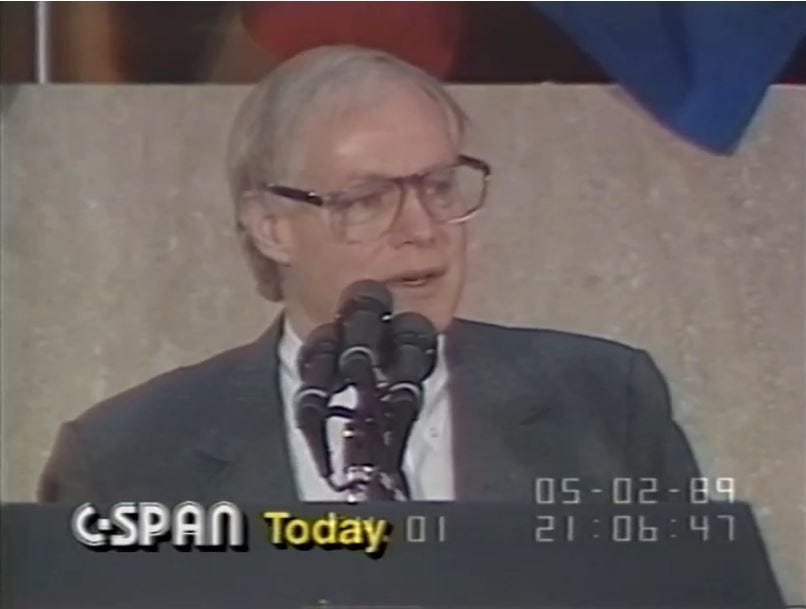Jim Leach passed away on December 11. As a Republican Congressman from Iowa, he was someone I looked up to. His principled stands on issues of war and peace helped influence my career path.
Many obituaries of Jim Leach feature his 2002 vote against going to war in Iraq as a representation of his iconoclasm as a moderate; he was one of only six House Republicans to vote against Bush-Cheney and pliant leaders in Congress. But that vote was preceded by more than two decades of a pro-peace, anti-militarist record in Congress.
My first job in Washington was with something called the Arms Control and Foreign Policy Caucus, a bipartisan and bicameral group of Members of Congress with a shared interest in controlling the growth of nuclear arsenals, moderating defense budgets, and stopping pugilistic foreign policies. My first project at the organization was to scrutinize the human records of the Salvadoran military leaders the U.S. government was arming, which I have written about here and here.
At that time, Congressman Jim Leach was a former chair of the Caucus and one of its leading members. Its Executive Director, Edie Wilkie, became my biggest mentor. While Rep. Leach’s activity through and in alignment with the Arms Control and Foreign Policy Caucus mostly came in the decade before I joined as staff, I felt his influence. These actions included:
Authoring a 1985 Caucus report, with Senator Mark Hatfield (R-OR) and Rep. George Miller (D-CA), critical of President Reagan’s policy on El Salvador and showing that his Administration was lying about the number of U.S. military advisers in the country;
Criticizing the Reagan Administration’s policy of arming the Contras, thus “doing to Nicaragua precisely what [the Administration] condemns the Sandinistas for doing to El Salvador, that is, supporting an armed insurrection;”
Sponsoring a bill with Rep. Mel Levine (D-CA) to prevent private funding of the Nicaraguan "Contras." (The College Republican National Committee had launched a fundraising campaign for Contra aid.);
Advocating for a comprehensive nuclear test ban and for a nuclear freeze; and
Championing the concept of an international criminal court to try leaders accused of genocide and war crimes, a decade before the International Criminal Court was established.
Jim Leach’s principled stand for rule of law wasn’t confined to the realm of foreign affairs. He resigned a position in the State Department during the Nixon Administration in response to President Nixon’s 1973 “Saturday Night Massacre,” which led to the resignation of the Attorney General and his deputy over White House demands to fire the special prosecutor investigating the Watergate break-in. “I concluded that I couldn’t serve the president from that time on,” said Leach.
I recall one anecdote that Edie Wilkie told me. She said that Congressman Leach’s chief of staff told her that, on the morning after Newt Gingrich and his “Contract with America” wave had taken over both Houses of Congress in the 1994 midterm elections ending long Democratic dominance, he sat on the edge of the bed and cried. While this wasn’t Leach himself, it was indicative of his reaction. Here he was, about to go into the majority for the first time and chair the powerful House Banking Committee, and it was met with mourning. Leach knew that the Gingrich wave was about to nullify much of what he – as a Republican -- had done and hoped to achieve.
And one of the first things Speaker Gingrich did when he took and centralized power was to eliminate all the funded caucuses, including the Arms Control and Foreign Policy Caucus, through which Rep. Leach had been able to partner on a bipartisan basis to advocate for saner foreign and military policies.
Jim Leach served in Congress for thirty years and remained in public policy long after that. It is unfair to his legacy to reductively view it through the lens of today’s moment, with Donald Trump coming back into office and everything he represents. But it is unavoidable.
Jim Leach took a thoughtful and pragmatic approach to policy. He was guided by principle and not cowed into towing the party line on policies he disagreed with. “He embodied civility” was the headline of his obituary in his home state newspaper. That is undeniably true.
Old timers in DC (like me) tend to over-mythologize the political past as a time of civility, shared interests, and compromise. It was never as chummy as we would like to remember it. But it was not like today. It was a time when a person like Jim Leach could repeatedly challenge the policies of the President of his party and still have that party give him the gavel of a big committee. This doesn’t happen today. See: Liz Cheney and Adam Kinzinger.
But beyond politics, on substance history has shown that Jim Leach was on the right side. Today, the Republican Party that Leach bucked on the Iraq war vote has turned against it, with most calling the invasion a mistake. The American interventionism in Central America in the 1980s is not viewed favorably. I think – I hope – that working to reduce the threat of nuclear is not seen as a negative.
I will miss Jim Leach. But even more, our national politics dearly miss Jim Leach and those like him.





I hadn’t heard of him before, thanks for sharing. I send my support to their family and our country.